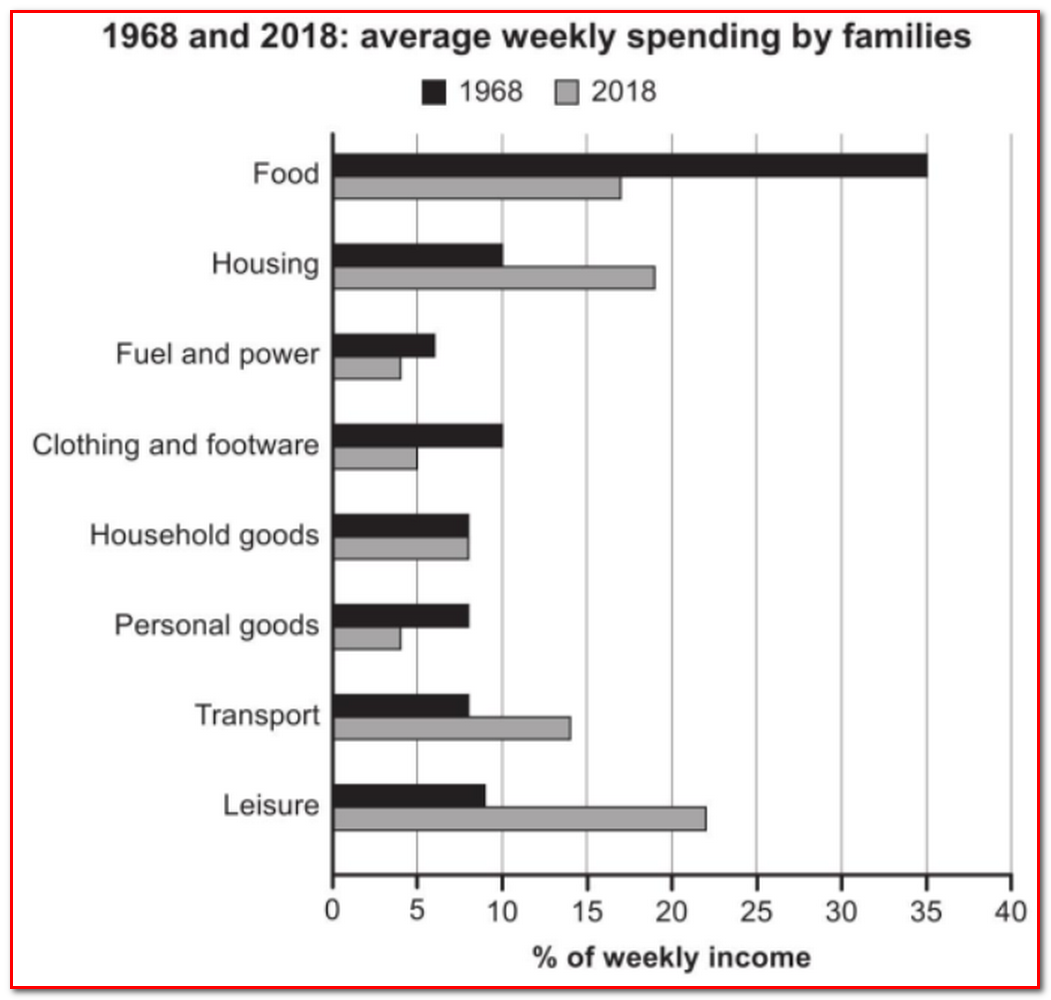The chart below gives information about how families in one country, spent their weekly income in 1968 and in 2018.
This writing was written by a student. (band 8)

Test 2 Task 1 Cambridge 17
The provided chart delineates the data concerning the weekly expenditure prospects of families in 1968 and 2018.
In 1968, the most substantial spent rate was on food, which accounted for 35% of the weekly income. Housing and clothing followed with an equal prospect of 10% of the weekly income. Expenditures on leisure, transport, personal goods, and household goods were almost equivalent, with the former being marginally higher. Finally, fuel and other expenses recorded the lowest rates at 6% in 1968.
However, in 2018, there was a significant change in family expenditure. The percentage of family income spent on food dropped remarkably to between 15 to 20 percent. On the other hand, housing expenditures rose considerably to almost 20%, slightly more than food expenditures. The most notable rise was observed in leisure expenditures, which soared by about 10% in 50 years. Transportation expenditures came next, followed by household goods and other categories, respectively. The last three categories, which were fuel and power, clothing and footware, and personal goods, remained the least, just as in 1968.
Overall, the weekly expenditure averages of families underwent a substantial transformation over 50 years. While some expenditure rates remained unchanged, some of the modifications were quite noticeable.
Delineates: means to describe or outline something in detail or to make something clear by providing a detailed explanation.
Expenditure: refers to the money that is spent or used to buy goods or services.
Substantial: means significant, sizable or considerable in amount, value, or importance.
Accounted for: means to be responsible for or to be the reason for a certain thing or action.
Equal prospect of: refers to two or more things that have the same likelihood or possibility of happening.
Marginally higher: means slightly higher or only a little bit higher than something else.
Dropped remarkably: means a significant decrease or reduction in something.
Observed in: means to notice or see something that is happening or present.
Underwent: means to experience or go through a change or transformation.
Modifications: refers to changes or alterations made to something in order to improve or adjust it.
Link Audio: https://youtu.be/1TDuH64cg3g
The writing below is band 9.0
The data depicted on the chart elucidates the weekly expenditure outlook of families in the year 1968 and in 2018.
In the year 1968, the most significant proportion of expenditure was allocated towards food, with a dominant 35% share. Housing and clothing were the next major categories with identical expenditure prospects of 10% of weekly income. Leisure, transport, personal goods and household goods incurred almost an equal proportion of expenditure, with the former category slightly exceeding the latter. Fuel and other categories recorded the least expenditure share, with a meager 6% in 1968.
Fast forward to 2018, the proportion of family expenditure on food witnessed a drastic decline, ranging between 15% to 20%. In contrast, housing expenditure surged significantly, accounting for almost 20% of weekly income, slightly exceeding food expenditure. The most noteworthy rise was recorded in the leisure expenditure category, which soared by around 10% over 50 years. Transport expenditure followed by household goods, and other categories respectively. The last three categories that recorded the least expenditure were fuel and power, clothing and footwear, and personal goods, just like in 1968.
In summary, the weekly expenditure averages of families underwent substantial changes over 50 years. While some expenditure categories remained stagnant, the alterations in others were quite prominent.
Reply